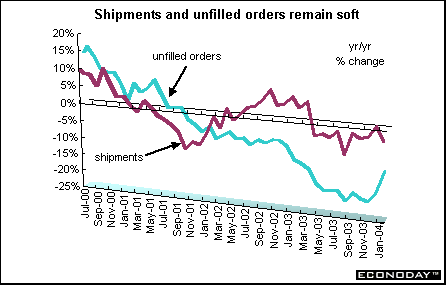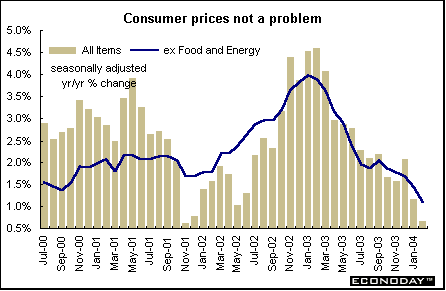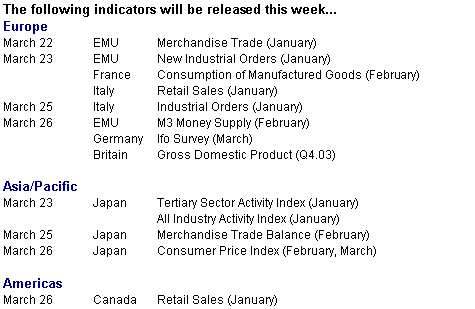Monday, March 22, 2004

Last Week's Highlights
Heightened terrorist concerns after the Madrid bombings left investors rather skittish. The dollar fell when new terrorist rumors emerged - anything terrorist is deemed a dollar negative. And equity and bond investors were affected as well. With no new economic information on Friday, the markets were virtually at a standstill waiting for word from Pakistan about whether they had captured a key al-Qaeda leader.
Oil prices climb to 13 year highs
Oil prices continue to climb prior to the March 31st OPEC meeting. Despite low inventories - especially in the U.S. - and rising demand - especially in China - OPEC seems intent on reducing production beginning on April 1st. Second quarter demand usually eases in conjunction with the end of the Northern Hemisphere heating season. Crude oil in New York has soared about 15.5 percent since OPEC's last meeting in February. OPEC members have a track record of producing over permissible quotas. But in February, members agreed to stop production in excess of their self-imposed quotas and agreed to cut an additional 1 million barrels a day. Prices are going up on speculation that rising gasoline demand and new U.S. fuel regulations may spur even higher prices during the peak summer driving months.

On Wednesday March 17th, Texas intermediate light crude ended trading at $38.18 a barrel, the highest closing price since October 1990 prior to the first Gulf war. So far this year the average price of oil has been about $35 per barrel compared with $31 in 2003. Prices were driven higher in the week by terrorism concerns in the wake of the Madrid bombings. Worries about U.S. gasoline inventories, which are now below their five-year average, are fueling fears of a supply crunch (even though crude stocks have risen slightly from near 30-year lows in the winter). But developed economies are less energy-intensive than in the 1970s when the first oil shocks occurred, thanks to the shift out of manufacturing into services and information technology.
Yen big mover in currencies
The yen rose against the dollar after a Japanese financial newspaper said the Bank of Japan may scale back sales of its currency to protect exporters. Some BoJ officials said they expected the Bank of Japan to reduce large-scale yen sales by the March 31st end of the fiscal year. The Bank has tried to stem the yen's rise during the last year so that Japanese goods don't become too expensive in the U.S. The BoJ, which acts for the finance ministry in the currency market, sold �10.5 trillion ($94.4 billion) in the two months ended February 25th, more than half of the annual record amount spent in 2003. Finance Minister Sadakazu Tanigaki told legislators in the upper house of the parliament that Japan won't keep selling the currency "forever."

The yen had its biggest weekly advance against the dollar in four years on speculation that the recovering economy is leading the government to reduce currency sales. The yen surged 3.9 percent against the dollar and jumped 3.2 percent against the euro. Tanigaki said yen sales were aimed at preventing speculative moves and not aimed at weakening the yen. This heightened speculation that the government is scaling back dollar-buying. Overseas investors continue to be net buyers of Japanese stocks for a 12th week in 13 according to the Tokyo Stock Exchange. This has increased the demand for yen.
The dollar benefited against the euro on Friday on reports that Pakistani forces were closing in on a top aide in the al-Qaeda terrorist network. But the dollar may only get a temporary boost on a capture as concern about possible retaliatory attacks may then weaken the currency. The dollar posted a brief rally on the first trading day after Saddam Hussein's capture, but retreated after a spate of car bombings in Baghdad. On Thursday, the dollar sank on rumors of a bomb scare in a rail tunnel between Britain and France. And the dollar tumbled on the day of the Madrid bombing as traders saw the attack as a setback for the U.S. and its allies in Iraq and also as a signal that terrorists may target the U.S. itself once again.

Global Stock Markets
Equities were mixed last week with those in Britain, Europe, Hong Kong, the U.S. and Canada retreating while the remaining indexes were up. The Dow, Nasdaq, FTSE and DAX are now under their end of 2003 levels. The Mexican Bolsa continues to outperform all indexes followed here. The Madrid bombing raised investors' sensitivity levels once again as they weighed the ramifications on U.S. growth. Investors continue to weigh terrorist events in terms of their repercussions on the U.S. economy, which in turn impacts those overseas.
Global Stock Market Recap

Europe and Britain
British, German and French equities were lower, dragged down in part by the Madrid terrorist attack along with the second damaging admission from Shell Oil over the classification of its proven crude oil reserves. After reviewing its data, Shell said a further 250 million barrels of reserves are to be re-categorized. This was in addition to a prior reduction in proved reserves that embarrassed the company and resulted in an executive overhaul. And earnings reports damaged investors' psyches. In Europe, shares of Bayer, the German chemicals and drugs manufacturer, fell after the company reported an unexpectedly large operating loss in 2003 as well as a sales decline - but despite this, forecast strong growth for this year. European equity markets had plenty to contend with, not least was the unexpected election victory for Spain's Socialist Party in the wake of the Madrid train bombing. The poll result sent shockwaves through the markets as investors faced up to the prospect of an increasingly divided Europe.

Asia/Pacific
Only the Hang Seng was down on the week, pulled lower by vacillating U.S. markets. But South Korea's Kospi led other Asian stock indexes higher on the week. The U.S. was South Korea's biggest export market in 2003, and the prospect that continuing low rates (after the FOMC left overnight U.S. interest rates at 1 percent) may keep consumers spending and boost employment buoyed investors' prospects for increased profits. Analysts said the impact of the impeachment of President Roh Moo-hyun was beginning to fade, and that investor attention has shifted to comments from the central bank that the economy should pick up in the second quarter of 2004. The prospect of growth in Asia's domestic economies is also helping the region's stock indexes outperform those in the United States. Indexes in China, Taiwan, Japan, Malaysia and South Korea have all gained more than 5 percent this year in dollar terms.

Japanese stocks rose after Bank of Japan Governor Toshihiko Fukui said consumer spending is growing faster than expected and the economy is gradually recovering. The Topix rose to its highest level since August 28, 2001. Enthusiasm among overseas investors for Japanese stocks continues to climb as the economy continues to grow. Japanese stocks are among the best performing in the region so far this year. The Nikkei is up 6.9 percent while the Topix has advanced 9.0 percent amid optimism that last year's export-led recovery is boosting employment and feeding an expansion in domestic consumer spending, retailing and bank lending.
Indicator scoreboard
EMU - February harmonized index of consumer prices inched up 0.2 percent and was up 1.6 percent when compared with last year. The monthly increase was due to higher service prices, especially holiday and accommodation costs. Core HICP, which excludes energy and unprocessed food, was up 0.4 percent and 2 percent on the year.

January seasonally adjusted industrial output dropped 0.4 percent but was up 0.6 percent on the year. Output was up in the Netherlands, Belgium and Germany but down in Portugal, Ireland, Finland, Spain, France and Italy. Data were unavailable for Greece, Luxembourg and Austria. All categories were down on the month with the exception of durable consumer goods output.

Germany - March ZEW index of financial experts' economic expectations dropped to 57.6 from 69.9 in February, marking the third month that the index has declined. The Madrid terrorist attack that took place toward the end of the survey period and had only a small negative impact on the expectations index. Survey results collected before the attack on March 11th resulted in an index reading of 59.1 while results collected after the attack resulted in a lower reading of 55.9. The index indicates that those expecting the German economy to improve still outweigh those expecting it to worsen. ZEW surveyed 313 German financial experts from March 1st to March 15th for their opinions on current economic conditions and the economic outlook for major industrial economies.

February producer price index inched up 0.1 percent but was down 0.1 percent when compared with last year. Energy prices inched up 0.1 percent but dropped 0.7 percent on the year. Excluding energy, the PPI rose both 0.2 percent on the month and on the year. Food producing and processing, semi-finished goods, and consumer goods were up on the month but capital goods prices were down.

Italy - January seasonally and workday adjusted industrial production declined 0.2 percent but was up 0.3 percent when compared with last year. Consumer and energy goods output were up but investment goods and intermediate goods were down.

January merchandise trade deficit with the rest of the world soared to �2.3 billion from a deficit of �623 million in December and a �2 billion in January of 2003. Exports plummeted 9.9 percent while imports sank by 7.2 percent.
Britain - February consumer price index was up 0.3 percent and 1.3 percent when compared with last year. This remains considerably below the Bank of England's 2 percent inflation target. The retail price index was up 0.4 percent and 2.5 percent on the year, while the retail price index excluding mortgage interest payments (the Bank of England's old inflation measure) was up 0.3 percent and 2.3 percent on the year. Clothing and footwear prices were down as seasonal discounts were extended into February.

February claimant count unemployment rate remained at 2.9 percent. Unemployment declined by 6,600. The International Labour Organization unemployment rate for the three months ending in January slipped to 4.8 percent from 4.9 percent for the previous three months. The number of ILO unemployed dropped by 33,000 jobs.

Average earnings for the three months ending in January 2004 jumped 4.5 percent when compared with the same three months a year earlier. During the three previous months, average earnings climbed 3.5 percent. Excluding bonuses, average earnings were up 3.6 percent.

February retail sales volumes were flat on the month but jumped 6.5 percent when compared with last year. Food sales were up, offsetting a decline in non-food sales.

Americas
Canada - January manufacturers' shipments edged down 0.2 percent and were down 3.3 percent when compared with last year. Thirteen of 21 manufacturing industries, accounting for 43 percent of total shipments, declined. The decline was concentrated in the durable goods sector but this was largely offset by rising industrial prices and higher nondurable goods manufacturing. Fabricated metal products, computer and electronic products and miscellaneous manufacturing shipments dropped. Higher petroleum prices and food shipments generally offset the declines of January. New orders jumped 2.5 percent. An indication of future production, new orders are at the highest level since October 2002. The transportation equipment and computer industries were primarily responsible for the increase. Manufacturers' backlog of unfilled orders rose 2.6 percent, the first increase since September. However, unfilled orders are still down 12.1 percent on the year.

February consumer price index was up 0.2 percent and increased by 0.7 percent when compared with last year. Core CPI, which excludes food and energy, slipped 0.2 percent and was up 1.1 percent on the year. Gasoline prices were up 3.4 percent but were down 5.8 percent on the year. The Bank of Canada's inflation measure which excludes eight volatile items was up 1.1 percent on the year. This compares with the Bank's inflation target range of 1 to 3 percent, tending toward the midpoint of 2 percent.

Bottom line
As the first quarter draws to a close, investors will be evaluating company statements with heightened scrutiny to see if they meet expectations. Investors in Europe will be watching for the stronger euro's impact on profits and sales. And Shell investors especially will be looking to see what happens next to the beleaguered company as it tries to figure out what went wrong with its reserve estimates again. Estimating reserves and their recoverability have always been vexing problems for all oil producers.
Japanese exporters have probably already completed profit repatriation prior to the end of their fiscal year on March 31st. The finance ministry has indicated that they might have the Bank of Japan intervene less in the foreign exchange markets. Now that the fiscal year is virtually over and profits on U.S. sales repatriated, it might be a good time ease intervention now that the economy appears to be on a more stable growth trajectory.
Looking Ahead: March 22 through March 26, 2004




